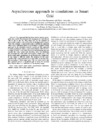Identificador persistente para citar o vincular este elemento:
https://accedacris.ulpgc.es/jspui/handle/10553/52074
| Título: | Asynchronous approach to simulations in smart grid | Autores/as: | Evora, Jose Hernández Cabrera, José Juan Hernandez, Mario |
Clasificación UNESCO: | 120326 Simulación 120304 Inteligencia artificial |
Palabras clave: | Agent-based model Asynchronous simulation Complex system Power grid Smart grid |
Fecha de publicación: | 2013 | Proyectos: | Framework Para la Simulación de la Gestión de Mercado y Técnica de Redes Eléctricas Insulares Basado en Agentes Inteligentes. Caso de la Red Eléctrica de Gran Canaria. | Conferencia: | 27th European Simulation and Modelling Conference (ESM'2013) | Resumen: | The approach used to analyze power grids is not suitable when demand side management is introduced. This is due to the fact that, from now on, the demand on power grids requires to be analyzed in a disaggregated manner. When the demand is represented using a bottom-up approach where every individual device is represented, a complex system approach for the simulation must be considered. This approach is usually performed under a synchronous timing which involves a unique clock for every entity. However, this paradigm does not consider the nature of the entity and, therefore, adjusts the simulation time development to the entity that requires a higher pace. This means that many calculations are performed even though they do not output a different result. The proposal of this paper considers this regard and allows each entity to develop their time according to their pace. The case study shows that this approach achieves a significant gain in terms of execution time whilst there is a small loss in the memory usage. | URI: | https://accedacris.ulpgc.es/handle/10553/52074 | Fuente: | Modelling and Simulation 2013 - European Simulation and Modelling Conference, ESM 2013, p. 137-141 |
| Colección: | Actas de congresos |
Los elementos en ULPGC accedaCRIS están protegidos por derechos de autor con todos los derechos reservados, a menos que se indique lo contrario.
